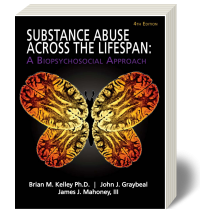

Substance Abuse Across the Lifespan: A Biopsychosocial Approach
Fourth Edition Graybeal, et al., © 2014, 346 pages
Prices and ISBNs
This title is available in the following formats.
|
Product
Description ISBN |
Description | ISBN | Bookstore (Net Price) |
Student (Retail Price) |
Supplements
The available Supplements are listed below:
Click here to access ancillaries save_altInstant Access (and Coupons)
All students can have free Instant Access to an eBook for the first two weeks of class while they procure their textbook. They will also receive a 10%-off coupon valid at the BVT web store for the best possible price. Get instant access codes here.
Instructor's Manual
The Instructor's Manual consists of chapter summaries, learning objectives, key terms, chapter and lecture outlines, answers to textbook review questions, lecture suggestions and classroom activities to better assist you with your teaching curriculum.In-Text Questions and Test Bank Materials
In-Text Questions and Test Bank Materials. Also includes links to and descriptions of top websites for substance abuse information.Excerpts
Description
While concerns regarding drug abuse and its consequences often seem overwhelming, there is good news; scientific progress has made the prevention and treatment of substance abuse disorders more effective. As our understanding of drug dependence and addiction improves, so does our ability to prevent, diagnose and treat it. As a first step in prevention and treatment, it is essential that students, teachers, and health professionals understand substance abuse from different perspectives. Substance abuse is a multidimensional problem and the new fourth edition of Psychology: Substance Abuse Across the Lifespan addresses it as such. The biopsychosocial effects of substance use and abuse is an area of scientific study that examines the immediate and long-term impacts of abused chemicals on biological, psychological, and sociological systems. As such, this book takes a fully integrative approach to the growing substance abuse problem. Also, this text provides a "lifespan approach". A lifespan approach refers to the analysis of behavior across the entire range of human development. Such development encompasses changes occurring from pre-conception through old age. Sadly, substance abuse issues are reflected across the entire range of development and, as such, one must not merely understand the variety of substances abused, but also how different developmental variables increase risk for use, abuse, and dependence.
Continuing Education (CE) Credits for Mental Health Professionals: HealthForumOnline (www.healthforumonline.com), a nationally-approved provider of continuing education (CE) for mental health professionals (https://www.healthforumonline.com/Accreditations/44/secure__true/), offers an opportunity to additionally purchase 20 Continuing education (CE) credits for reading Substance Across the Lifespan: A Biopsychosocial Perspective 4th Edition and successfully completing a test of learning achieved and a brief program evaluation.
https://www.healthforumonline.com/Our-Courses/16/secure__true/categoryId__30/
For more information about how to additionally purchase 20 CE credits to supplement Substance Across the Lifespan: A Biopsychosocial Perspective 4th Edition, please visit https://www.healthforumonline.com/Our-Courses/Courses/47/secure__true/categoryId__30/productId__116/ .
PLEASE NOTE that HealthForumOnline (HFO), ONLY provides the continuing education (CE) materials associated with Substance Across the Lifespan: A Biopsychosocial Perspective 4th Edition. CE materials include online access to the 100-item test of learning achieved and brief program evaluation, as well as the ability to generate your own completion certificate upon successful completion of the online test (>75% correct). You can also opt to download PDFs of these related CE materials if you prefer to fax or email your responses to HFO to have your test manually scored and your certificate emailed to you. For detailed instructions on how to complete the CE process from purchase through certificate generation see HFO's FAQ section (https://www.healthforumonline.com/FAQ/20/secure__true/).
Examination copies of this book are only available in digital format.
Please email us to request access.